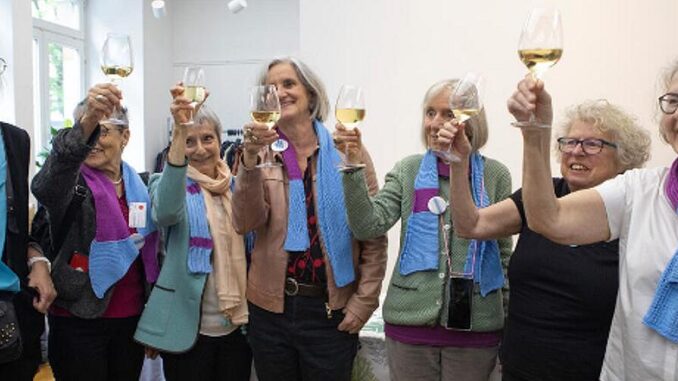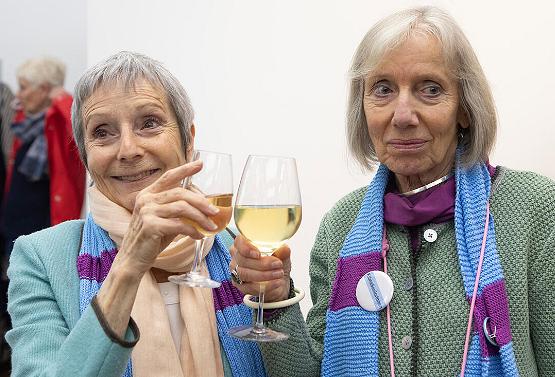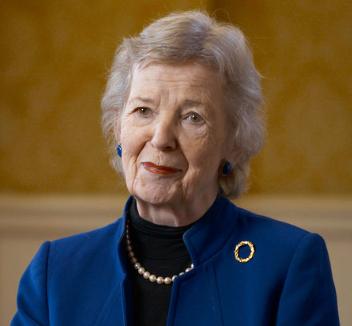
STRASBOURG, France, April 9, 2024 (ENS) – The European Court of Human Rights today sided with a group of senior Swiss women who sued the government of Switzerland for placing them at greater risk of death from heat waves by failing to do enough to halt climate change.
The lawsuit seeking stiffer limits on greenhouse gas emissions was brought by the Swiss women’s association Elders for Climate Protection, whose 2,500 members average 73 years old, and four individual plaintiffs.
They argued that older women are especially vulnerable to extreme heat and other climate change impacts, giving them standing to bring their case under the European Convention on Human Rights, and the court agreed.
On March 29, 2023, their lawsuit was the first climate complaint ever to be heard in public before the Grand Chamber of the European Court of Human Rights. Today, a year later, the court issued its verdict.
The ruling states that the Swiss state violated the “right to respect for private and family life” guaranteed under Article 8 of the European Convention on Human Rights.
For the first time, the court decided that climate protection is a human right, and that the region’s governments are obligated to protect their citizens from the effects of global heating.

The ruling sets a precedent as to whether and to what extent states with an inadequate climate policy violate their duty to protect human rights, according the Greenpeace International whose lawyers supported the legal team of the Swiss Elders for Climate Protection.
The court based its ruling on the European Convention on Human Rights, which guarantees “a right for individuals to enjoy effective protection by the state authorities from serious adverse effects on their life, health, well-being and quality of life arising from the harmful effects and risks caused by climate change.”
The judges found that Switzerland had failed to comply with its duties regarding climate change under the Convention and must now reconsider its current climate targets based on science.
The decision, which cannot be appealed, is final and binding across the 46 countries that are signatories to the European Convention on Human Rights.
Greenpeace International and the Elders for Climate Protection now plan to take their case to the International Court of Justice in The Hague, where hearings are expected to start early in 2025.
Legal counsel at Greenpeace International Louise Fournier says more action is pending. “This doesn’t stop in Strasbourg. The KlimaSeniorinnen’s stories are also on the agenda for the International Court of Justice, where hearings on all governments’ climate justice obligations will be held early next year.”
The European Court of Human Rights ruling is likely to have a bearing on numerous other climate lawsuits now ongoing against governments and corporations, a goal in line with the goals of Mary Robinson, former president of Ireland, who now chairs the Elders for Climate Protection.
In a March 24 speech at the Investment Treaties Conference of the Organisation for Economic Co-operation and Development, OECD, Robinson defined The Elders as, “a group of independent global leaders founded by Nelson Mandela who work for peace, justice, human rights and a sustainable planet.”
“The Elders have worked on the climate and nature crisis since we first came together in 2007, and it is a top priority for us, as part of a strategy focused on existential threats, and fostering leadership commensurate with the scale of the crises facing humanity,” she told the OECD audience.

“And I am also speaking as a grandmother – an “angry granny” if I may say so, who is deeply concerned about the type of world my grandchildren and future generations will inherit if we do not step up and take the necessary, urgent action to tackle the climate and nature crisis,” Robinson said.
“Right now, we are failing to rise to the challenge,” she warned.
“The science is clear, we can see all around us the increasingly dire climate impacts unfolding, and that it is the poorest and those least responsible people in the world who bear the brunt. This is why we need what The Elders are calling ‘long-view leadership,’ that moves beyond short-term business and electoral cycles to deliver truly sustainable policy solutions,” Robinson told the OECD convention.
Cordelia Bähr, who served as lead lawyer for the Swiss Elders for Climate Protection, said, “I am absolutely overwhelmed and extremely proud that after nine years of intensive work, the senior women have finally got their due. This is an indescribable moment. The significance of this decision cannot be overestimated. It will be of great importance for further climate lawsuits against states and companies worldwide and increase their chances of success.”
“Bähr said, “The judgement shows citizens, judges and governments across Europe what is needed in terms of climate protection in order to respect human rights.”
Featured image: Members of the Swiss Senior Women for Climate Protection sued Switzerland before the European Court of Human Rights for pursuing an inadequate climate policy, thus violating their human rights. Today they toasted the court’s ruling in their favor. April 9, 2024, Strasbourg, France (Photo © Miriam Künzli / Greenpeace)



